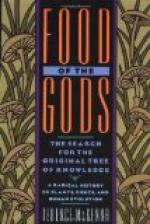[Illustration—Drawing: MODERN MEXICAN COCOA WHISK WITH LOOSE RINGS. (Brought home by the author.)]
The introduction of cocoa into Europe, indeed, as well as its cultivation for the European market, is due rather to the Jesuit missionaries than to the explorers of the Western Hemisphere. It was the monks, too, who about 1661 made it known in France. It is curious, therefore, to notice the contest that at one time raged among ecclesiastics as to whether it was lawful to make use of chocolate in Lent; whether it was to be regarded as food or drink. A consensus of opinion on the subject, published in Venice in 1748, states that
“Among the first Probabilist Theologians who undertook to write entire Treatises and to collect all the possible reasons as to whether the Indian beverage (chocolate) could agree with European fasting, was Father Tommaso Hurtado. He employed the whole of the Tenth Treatise of the second volume of the ’Moral Resolutions,’ printed in 1651, and added thereto an Appendix of more chapters.
“Father Diana found reason for acquitting the consciences of those who, in time of fasting, should drink chocolate. Father Hurtado, more courageous withal, and more benign than Diana, does not speak of this treatise in order to investigate the law; the nature of fasting admits drinking without eating. Therefore consumers are, without the help of casuists, troubled themselves and afflicted, when in Lent they empty chocolate cups. Excited on the one hand by the pungent cravings of the throat to moisten it, reproved on the other by breaking their fast, they experience grave remorse of conscience; and, with consciences agitated and torn with drinking the sweet beverage, they sin. Under the guidance of these skilful theologians, the remorse aroused by natural and Divine light being blunted, Christians drink joyfully. For all agree that he will break his fast who eats any portion of chocolate, which, dissolved and well mixed with warm water, is not prejudicial to keeping a fast. This is a sufficiently marvellous presupposition. He who eats 4 ozs. of exquisite sturgeon roasted has broken his fast; if he has it dissolved and prepared in an extract of thick broth, he does not sin.”
As for the introduction of cocoa into this country, the contemporary Gaze tells us that
“Our English and Hollanders make little use of it when they take a prize at sea, as, not knowing the secret virtue and quality of it for the good of the stomach, of whom I have heard the Spaniards say, when we have taken a good prize, a ship laden with cocoa, in anger and wrath we have hurled overboard this good commodity, not regarding the worth of it.”
About the time of the Commonwealth, however, the new drink began to make its way among the English, and the Public Advertiser of 1657 contains the notice that “in Bishopsgate Street, in Queen’s Head Alley, at a Frenchman’s house, is an excellent




